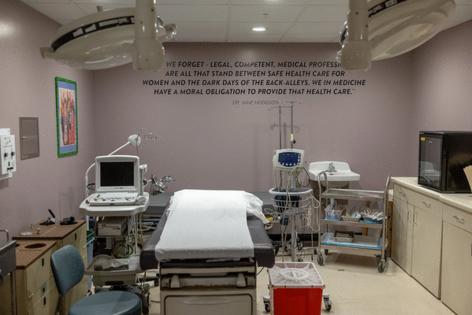In Minnesota assassination, abortion-rights supporters hear echoes of past violence
Published in News & Features
MINNEAPOLIS — Abortion providers spent the weekend in fear they could be targeted by the man charged in the assassination of Minnesota House DFL leader Melissa Hortman and shooting of Sen. John Hoffman.
The more than 40 hours police spent searching were “terrifying” as reports surfaced that the alleged killer had a list of potential targets that included abortion-rights supporters, said Amy Hagstrom Miller, president and CEO of Whole Woman’s Health Alliance.
And while violence against abortion providers is nothing new, Hagstrom Miller said there’s a perception that it’s a problem mostly in red states.
“This happened in Minnesota,” she said, “and this can happen in a blue state that has protections for abortion.”
Hortman, her husband Mark, Hoffman and his wife, Yvette, were shot in the early hours of Saturday morning, kicking off the largest manhunt in state history. The Hortmans were killed; the Hoffmans underwent life-saving surgery. Police apprehended Vance Boelter late Sunday evening and charged him in state court.
Monday morning, officials charged Boelter in federal court in connection with the killings, calling his alleged actions “the stuff of nightmares.” Along with firearms and ammunition, they found in his belongings notebooks with lists of Minnesota officials and their home addresses.
While law enforcement officials haven’t revealed what they believe to be the motive behind the shootings, the target list, according to people familiar with the investigation, also includes abortion-rights advocates. Authorities haven’t ruled out the possibility Boelter may have worked with someone to plan or execute the attacks.
Leading anti-abortion groups in Minnesota swiftly condemned the violence. Minnesota Citizens Concerned for Life said in a statement while Boelter’s motivations were not yet known, “his actions are completely antithetical to the mission of MCCL and the pro-life movement.”
“MCCL has always worked peacefully to advance protections for the vulnerable, and has always deplored and unequivocally condemned violence,” the group’s executive director, Cathy Blaeser, said.
Human Life Alliance said in a statement that it promotes its cause “in a spirit of prayer and non-violence” and called Boelter’s alleged actions “contrary to the pro-life mission.”
“Violence has no place in our society, from the womb to our homes, businesses and communities. We praise the swift action by law enforcement to prevent more violence and are praying for the Hoffmans’ recovery and for the Hortman family who grieve this tragic loss,” the group said.
Both MCCL and Human Life Alliance said Boelter was unknown to their organizations before the shootings.
In the nearly three years since the U.S. Supreme Court overturned Roe v. Wade and its constitutional protections for abortion, several of Minnesota’s neighboring states have enacted restrictions, making Minnesota an island in passing legislation to protect abortion.
For reproductive-rights advocates in Minnesota, the killing of the Hortmans and shooting of the Hoffmans by someone allegedly also targeting abortion-rights supporters echoes a long history of violence against clinics and providers.
Since the mid-1970s, almost a dozen abortion providers have been slain, according to the National Abortion Federation. Clinics have been attacked or vandalized, and providers have been threatened. Protestors have formed blockades in front of clinics or intimidated patients and staff.
“It is just kind of baked into the experience of working in reproductive health care, unfortunately, to have to worry about your personal safety,” said Megan Peterson, executive director of Gender Justice Action. “And it’s really disturbing and upsetting to me to see that now expanding even further beyond those who are just directly providing care.”
Some of the most extreme rhetoric around abortion perpetuates the problem, Peterson said, as does increasing political violence in general. She cited an attack on former U.S. House Speaker Nancy Pelosi’s husband, the assassination attempts against Trump and the insurrection on the U.S. Capitol.
“When you keep conflating abortion as murder or even suggesting that people are committing infanticide,” Peterson said, “that is participating in creating the environment that emboldens people to use violence as a tool.”
Violent political rhetoric and President Donald Trump’s decision to pardon individuals with federal convictions connected to disrupting abortion clinics, Hagstrom Miller said, contributes to the danger.
“(Boelter) doesn’t represent a majority,” Hagstrom Miller said, “but this guy is responding to a culture right now where terrorism is being normalized and it’s being permitted.”
Brian Klaas, who worked in Minnesota politics before leaving the U.S. to research political violence and authoritarianism, teaches at University College London. He said while acts of violence are often perpetrated by individual actors, toxic political rhetoric in the U.S., driven primarily by Trump, is “predictably producing violence.” Often, he said, those who resort to violence believe they are acting righteously.
“I think a lot of people feel that there are existential threats to core moral principles at stake,” Klaas said. “And that causes people to act more.”
While anti-abortion rhetoric and threats aren’t new, the violence that played out in Minnesota over the weekend is a crossroads, presenting an opportunity to change course, said Ruth Richardson, president and CEO of Planned Parenthood North Central States and a former Minnesota House member.
“Running for office shouldn’t be a death sentence,” Richardson said. “Having a different political viewpoint shouldn’t be a death sentence, and attempting to access care or provide care or advocate for reproductive freedom shouldn’t be a death sentence.”
_____
©2025 The Minnesota Star Tribune. Visit startribune.com. Distributed by Tribune Content Agency, LLC







Comments